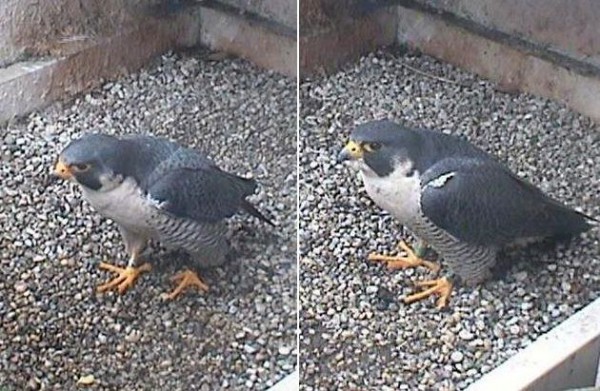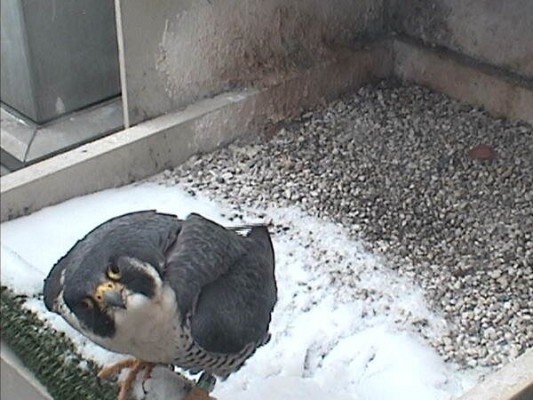
(You may have seen a bit of this on Facebook. Here’s more information.)
Since E2’s death many of you worry that Hope’s eggs at the Cathedral of Learning peregrine nest will not survive.
Some of you have even asked that we intervene to rescue and incubate the eggs ourselves, or that we leave food for Hope so she doesn’t have to leave the eggs.
Here’s why intervention is unnecessary, why “feeding” her will not work, and why either one of those attempts will wreck your viewing of Hope’s activities.
Why intervention is unnecessary:
Peregrine falcons delay incubation of their eggs until the female has laid the next-to-last or last egg. If the eggs are not incubated, but are protected from freezing and overheating (in other words, covered by the adult when temperatures are low or high), the eggs can wait several weeks for delayed incubation to begin and can hatch successfully. I do not know the longest amount of time they can delay, but it is long.
We’ve seen this happen in Pittsburgh. In 2010 Tasha laid two eggs at the Gulf Tower in mid March but Dori displaced her and became Louie’s new mate. Tasha’s eggs waited three weeks while Dori bonded with Louie and laid her own clutch of three. In the end, all five eggs hatched in May.
If Hope is delaying incubation, these eggs can wait a very long time.
And if she is not delaying: Within the breeding season, peregrines lay a replacement clutch when they find a new mate or if the first clutch fails early in the season.
The bottom line is, you don’t need to worry about eggs.
Why leaving food for Hope will not work:
At the end of the last century when peregrines were endangered throughout the U.S. and Canada, they were so rare that wildlife officials tried to offer supplemental food to widowed females. It doesn’t work. Peregrines are not scavengers (bald eagles are) and we humans are the peregrines’ #1 enemy. It doesn’t matter where you leave the food. Wild peregrines refuse food left by humans.
Why intervention of any kind will wreck your viewing of Hope’s activities:
Hope is at a first class “cliff,” a very valuable territory, so a new mate will find her. If we intervened in any way, Hope and her new mate would decide the area is unsafe (from humans!) and would leave the Cathedral of Learning forever. Then there would be no peregrines on camera at all. Intervention would wreck everything.
Wild peregrines’ lives are often very different than we assume. It is a privilege to watch and learn from them.
(photo from Wikimedia Commons. Click on the image to see the original)
p.s. It is against Federal law to take birds’ eggs. In Pennsylvania, peregrine falcons are managed and protected by the PA Game Commission. They make the decisions on peregrines and their welfare based on peregrine falcon biology.
For more information about peregrine falcon biology and family life see my Peregrine FAQs.
Stay up to date on peregrine news by checking this link.












